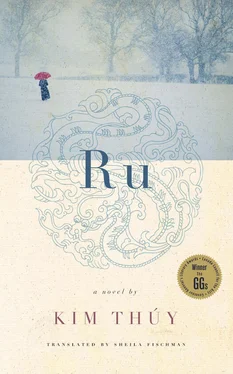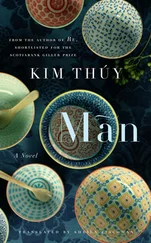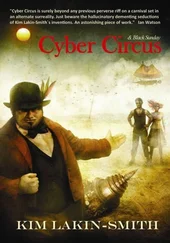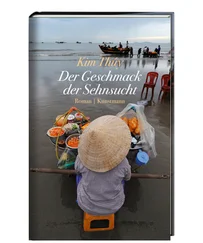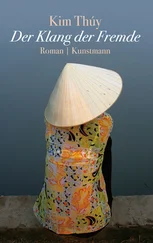My mother often got mad at me for being too self-effacing. She told me I had to step out of the shadows, work on my outstanding features so that the light could be reflected there. Every time she tried to take me out of the shadows, out of my shadow, I drowned myself in tears to the point of exhaustion, until she left me behind on the back seat of the car, asleep in the scorching heat of Saigon. I spent more time in people’s driveways than in their sitting rooms. Sometimes I woke up to the sound of children innocently whirling around the car, sticking out their tongues and snickering. My mother thought that defending myself would strengthen my muscles. In time she was able to turn me into a woman, but never into a princess.
Today, my mother regrets not bringing me up to be a princess, because she’s not my queen in the way that Uncle Two was a king to his children. He maintained the royal status until his death, even though he never signed a note for the teacher, read a report card or washed his children’s dirty hands. Sometimes my cousin and I were lucky enough to travel on my uncle’s Vespa, my cousin standing in front, me sitting behind. Sao Mai and I waited for him many times under the tamarind tree in front of our primary school, until the janitor padlocked the doors behind us. Even the men who sold pickled mangoes, guavas with spicy salt and chilled jicama had already left the sidewalk in front of the school when Mai and I, dazzled by the setting sun, would see him coming in the distance, hair windblown, wearing a fiery smile, incomparable.
He would take us in his arms and all at once not only were we transformed into princesses, but we were in his eyes also the prettiest, the most highly prized. That moment of euphoria only lasted the length of the journey: very soon he would have a woman in his arms, rarely the same one, who became in turn his princess of the moment. We would wait for him in the sitting room until the new princess stopped being a princess. Each of those women had the satisfaction of thinking she was the chosen one, even if she was well aware that she was only one among many.
My parents were very critical of Uncle Two’s casual attitude. That was why, without Uncle Two ever asking me, I never talked about the long waits outside school or the evenings in the sitting rooms of unknown women. If I’d exposed him, he wouldn’t have been allowed to pick us up. I would have lost the chance of being a princess, of seeing my kiss transformed into a flower on his cheek. Thirty years later, my mother would like me to place upon her cheeks those same kisses turned into flowers. Maybe I did become a princess in her eyes. But I’m just her daughter, only her daughter.
From Quebec, my mother sent money to Uncle Two’s sons so they could get away by boat as we had done. After the first wave of boat people in the late 1970s, it no longer made sense to send girls to sea because encounters with pirates had become inevitable, a ritual of the journey, an inescapable injury. So only the two older boys set out on the fugitives’ bus. They were arrested during the journey. Their father, my uncle, my king, had denounced them … Was it from fear they’d be lost at sea or from fear of reprisals against him, their father? When I think back on it, I remind myself that he couldn’t tell them he’d never been their father, only their king. He must have feared being pointed to publicly as an anti-Communist. He was certainly afraid of appearing in public, where he’d have been at home a short time before. If I’d had a voice then, I’d have told him not to denounce them. I’d have told him that I never informed on him for being late or made mention of his escapades.
Jeanne, our good fairy with a T-shirt and pink tights and a flower in her hair, liberated my voice without using words. She spoke to us — her nine Vietnamese students at the Sainte-Famille elementary school — with music, with her fingers, her shoulders. She showed us how to occupy the space around us by freeing our arms, by raising our chins, by breathing deeply. She fluttered around us like a fairy, her eyes stroking us one by one. Her neck stretched out to form a continuous line with her shoulder, her arm, all the way to her fingertips. Her legs made great circular movements as if to sweep the walls, to stir the air. It was thanks to Jeanne that I learned how to free my voice from the folds of my body so it could reach my lips.
I used my voice to read to Uncle Two just before he died, in the very heart of Saigon, some of the erotic passages from Houellebecq’s Particules élémentaires . I no longer wanted to be his princess, I’d become his angel, reminding him how he had dipped my fingers into the whipped cream on café viennois while singing Besame, besame mucho …
His body, even once it was cold, even once it was rigid, was surrounded not only by his children, by his wives — the old one and the new — by his brothers and sisters, but also by people who didn’t know him. They came in the thousands to mourn his death. Some were losing their lover, some their sports reporter, others their former member of parliament, their writer, their painter, their hand at poker.
Among all these people was a gentleman who was obviously destitute. He wore a shirt with a yellowed collar and wrinkled black pants held up by an old belt. He stood in the distance, in the shade of a royal poinciana laden with flame-red blossoms, next to a mud-stained Chinese bicycle. He had waited for hours to follow the funeral procession to the graveyard, which was in the outskirts of the city, enclosed within a Buddhist temple. There again he stood off to one side, silent and unmoving. One of my aunts went over and asked him why he’d pedalled all that distance. Did he know my uncle? He replied that he didn’t know him but that it was thanks to my uncle’s words that he was alive, that he got up every morning. He had lost his idol. I hadn’t. I’d lost neither my idol nor my king, only a friend who told me his stories about women, about politics, painting, books; and mostly about frivolity, because he hadn’t grown old before he died. He had stopped time by continuing to enjoy himself, to live until the end with the lightness of a young man.
So perhaps my mother doesn’t need to be my queen; simply being my mother is already a lot, even if the rare kisses I place on her cheeks aren’t so majestic.
My mother envied my uncle’s irresponsibility, or rather his capacity for it. In spite of herself, she was also jealous of her little brother and sisters’ status as king and queens. Like their older brother, her sisters are idolized by their children for a variety of reasons, one because she’s the most beautiful, another the most talented, yet another the smartest … In my cousins’ eyes, their mother is always the best. For all of us, including my aunts and cousins, my mother was only frightening. When she was a young woman, she’d represented the highest authority figure. Zealously she imposed her role of older sister on her little sisters, because she wanted to break away from her big brother, who gobbled up every presence around him.
So my mother had taken on the duties of man of the house, Minister of Education, Mother Superior, chief executive of the clan. She made decisions, handed out punishments, put right delinquents, silenced protesters … My grandfather, as chairman of the board, didn’t look after everyday tasks. My grandmother had her hands full raising her young children and recovering from repeated miscarriages. According to my mother, Uncle Two was the embodiment of selfishness and egocentricity. And so she became established as manager of the supreme authority. I remember one day when my grandmother didn’t even dare ask her to unlock the bathroom door and release her little brother and sisters who were being punished for going out with Uncle Two without my mother’s permission. As she was only a young girl, she administered her authority — naively — with an iron hand. Her revenge against her older brother’s nonchalance and the way the children revered him was poorly planned, because the youngsters went on playing in the bathroom, and did it without her. All the fun of childhood slipped between her fingers while, in the name of propriety, she was forbidding her sisters to dance.
Читать дальше
